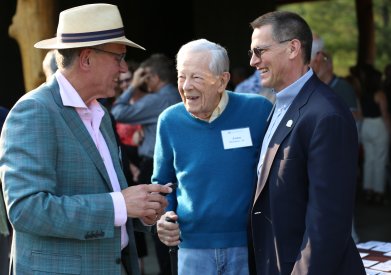Choosing Wisely: The Challenge of Overcoming Fear
June 25, 2018
Anytime I present on Choosing Wisely to an audience of clinicians, the subject of exposure to liability for not doing tests and procedures invariably comes up, as it once did when I spoke to a group of rural physicians outside my hometown in Syracuse. They told me that Choosing Wisely was just another pain point in their practice and that it put them at a higher risk for malpractice.
Malpractice is a real concern among physicians yet little evidence supports the claim that reducing unnecessary tests and procedures translates into increased risk for malpractice. Data exists on the relationship between malpractice claims and the quality of clinician communication, the importance of the patient-physician relationship and delayed or misdiagnosis. We also know the impact of being named in a lawsuit or complaint. My message to audiences I speak to centers on the degree of tolerance clinicians can shoulder when it comes to uncertainty – an inadequate answer I am sure.
Uncertainty is a state in which physicians must navigate often. Per authors Charlie Wray and Hyung Cho in a recent Annals article, “Medical uncertainty is not based on a knowledge deficit, rather it stems from the inherent ambiguity of the practice of medicine (1) and results from many factors… [such as] the intrinsic complexities of the health care system, natural variability in patients, unclear disease presentations, and heterogeneity of clinical practice.” The authors go on to state that the so-called “grey zones” of uncertainty are often filled with unnecessary care. It seems then that my answer around a physician’s degree of tolerance regarding risk has legs. But it doesn’t help physicians navigate the “uncertainty gaps” in order to choose wisely.
So I was delighted to hear a talk at the Choosing Wisely Australia (@ChoosingWiselyAU) 2018 National Meeting sponsored by NPS MedicineWise, a not-for-profit organization funded by the Austrailian Department of Health. (I was invited to speak about what we have learned and achieved with the Choosing Wisely campaign in the U.S.). During the meeting, I attended a talk by Nola Ries, a member of the Faculty of Law at the University of Technology Sydney. Ries is the author of “Choosing Wisely: Law’s Contribution as a Cause of and a Cure for Unwise Health Care Choices” from the Journal of Law and Medicine.
Ries found that clinicians in Australia fear litigation more than they actually face it and that such fear drives more testing and procedures. This is not surprising—fear is a strong driver of our actions.
Perhaps the root cause of the uncertainty is fear and we need to address the fear. In the United States, a fear-based environment for physicians starts back in training when residents fear “messing up” a case and the wrath of their attending. Although the safety movement has made progress, there remains a blame-and-shame culture for medical errors. Thus it stands to reason that fear is the main driver of overuse—the fear of uncertainty, of saying “I don’t know for sure,” the fear of missing something and/or being sued for malpractice, the inherent fear that exists at the very start of a career in medicine. And it is this aspect of the environment and culture that needs fixing.
Ries shared a slide about reducing fear by shifting from defensive practices to preventive practices, such as:
- Adversarial relationships → Shared interests
- Test and treat rather than talk → Effective communication
- Uncertainty avoidance → Tolerance of uncertainty
- More is better mindset → Education
Ries’ framework is really a prescription to decrease fear and increase the quality and safety of care. I imagine that the lessening of fear would also bring about greater joy in practice. For this to happen, leadership needs to change the environment and support strategies such as those outlined by Ries. We need to study the fear factor in American medicine, particularly as it pertains to perceived versus actual instances of litigation.
It is amazing to me that I traveled more than 24 hours to learn this gem, which could have such an impact on this country’s clinicians. There is so much we can learn from other countries implementing Choosing Wisely. I look forward to finding the next gem.

Daniel B. Wolfson
EVP & COO, ABIM Foundation


